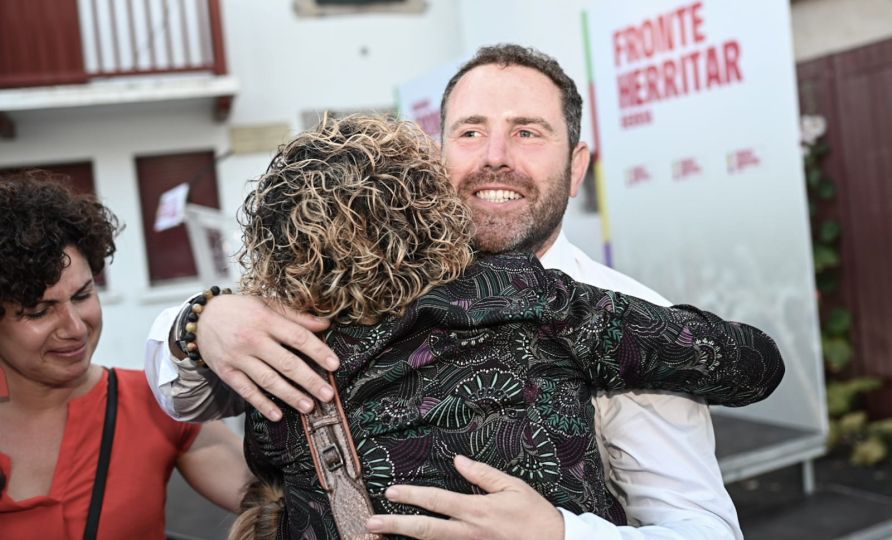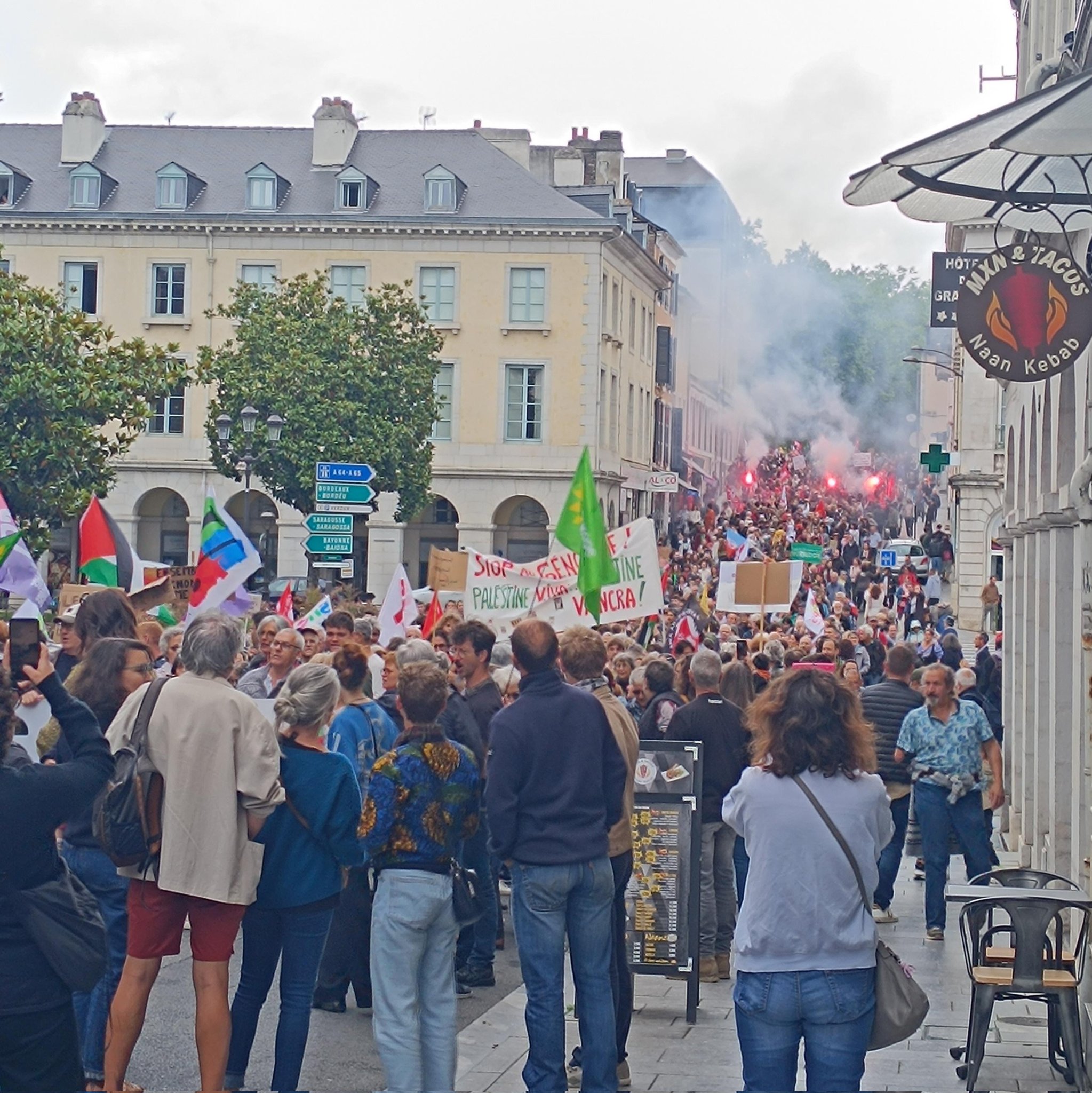It can be created!
- The citizens of Iparralde went from claiming the Basque Department to claiming the Territorial Community. Neither can the European Community Kosta (HELEP) be the political institution of local Basque citizenship. We find it impossible to achieve the first two demands from the present socio-political situation. For its part, Herri Elkargoa can be a great step in the achievement of a Basque institution of its own. The representation of the CAPV, Navarra and Iparralde in a single Basque territory, through the relations between the different local institutions, would be a historic moment. An old dream.
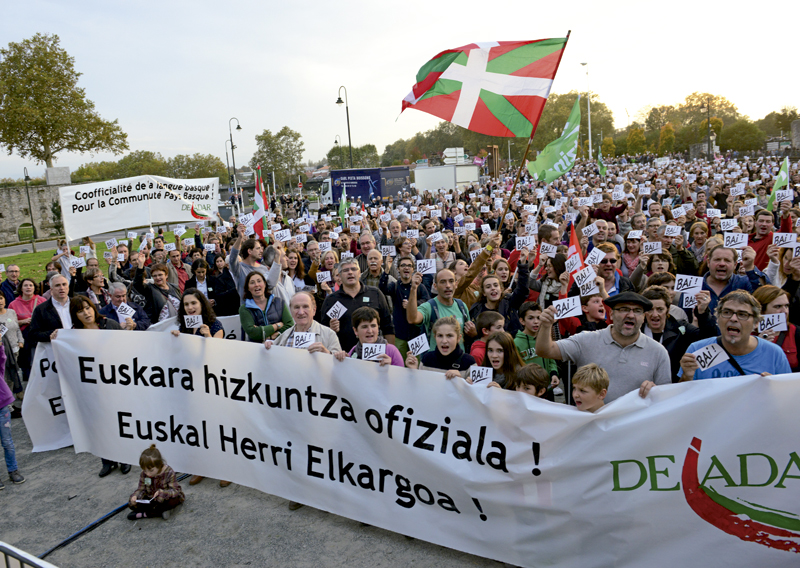
France has never recognised Euskal Herria. The current institutional framework of the State emerged during the Revolution (1789-1799). Successive governments, whether left-wing or centre-right, have always rejected the Basque institution. The Basque Department was proclaimed for more than two centuries, which has been consolidated since the middle of the last century. Since then, there have been many initiatives in favour of an institution of its own. The current political situation began to change in the early 1990s. Local social, political and cultural actors began to think differently about the Basque territory. The Development Council began to take shape in 1995, promoted by civil society, under the eyes of the Council of Elects. It was then that they began to design the departments that will form the current Commonwealth and, for the first time, the Development Council began to raise funds from the hand of the Department of State-Region. The Territorial Development Contract was then established. The contract is for six years. It has been renewed three times. One of the peculiarities of the contract is that the money is not legally used by the Development Council, but that the social associations and their agents present their projects and are negotiated directly with the State. Many projects have been developed in the name of the Pays Contract.
End of name Pays
In 2010, Nicolas Sarkozy promoted the reform of the French Territory, which culminated in the designation of Pays, which was replaced by Vladimir Putin. Through the Pays structure, territories without institutions have been able to develop their own needs. Euskal Herria has pioneered the Hexagon.
The intention of the Development Council has been to endow the Basque Country with an institutional character. The advice of the electorate, on the other hand, did not, at least in the same spirit as the previous one. When Pays declared himself endangered, there was no consensus among the members of the Council of Elects for the future. The Development Council was in danger of extinction in the year 2,010, with ups and downs and tensions and many uncertainties among civil society actors. The Development Council, which represents civil society, realized that it was gathering a vital force in its environment. Thus, the Development Council sent the following message to the public: “We cannot accept less than what the Pays structure has given.”
The Development Council met in Paris with the then Prime Minister, Édouard Balladur. They were never known initiatives of the members of the Development and Elect Council, including Members and Senators of Paris. A qualitative leap took place, especially the change of political positions. The Governing Council and the Government of Euskal Herria recognized it strongly, and underneath it felt an organized society. Encouraged by the social partners, the Development Council was prepared to go further and to negotiate vigorously the steps to be taken for the establishment of the institution in the Basque territory.
That kind of display of force “brought a kind of peace” in the North. In the face of the “attack” of the reform of the French territory, there was a kind of rapprochement between the Development and Elected Councils. The new attitudes contributed to the development of strategies for the constitution of an institution under construction.
In the year 2,010 the social partners involved in the work in favour of the project, the government wanted to introduce a kind of ras-le-bol: “From a legal point of view, you don’t have to give yourself an institution,” he said. The Government usually places the Basque Country among the countries of ancient times, and has always placed the Basque claim outside the framework of the French legal system. However, the Development and Elected Councils and society ' s associations were prepared to negotiate. Thus, in the year 2,011, the State, led by it, brought together all the agents involved. It put civil society and the elected on the way to creating a collective project.
Territorial Collectivity
The option offered by the State was not to enter the demands, but in the contents. The main question was this: “What do we want for Basque Country?” Stakeholders agreed on eight topics: economy, tourism, agriculture, culture, language, housing, transport and cross-border. Based on these areas, the initiative was called Territorial Collectivity. There is an article in the French Constitution that allows the creation of specific Communities. For example, the capital of Paris. It's a specific community that groups together a department and a city into an association. Corsica is the second. The third is Lyon. The latter has merged the department and the agglomeration. The supporters of the institution of the Basque Country approved this formula. For two months, they worked without fear, in silence. They looked to the left, to the right and to the consensus of the center, and they did. It was almost unanimously granted to the Territorial Community. The Development and Elected Councils, the Batera platform, the Chamber of Commerce and Industry of the Basque Country and the other agents, were presented in the ministry responsible for the Institutional Reform. It was 2013. The Development Council presented the draft in a forum to civil society. However, the French Government blocked the project. According to those involved in the project, the government did not want to hear the name of Euskal Herria. In the words of the Government, it was an old scheme and the usual demands. It rejected the Territorial Collectivity. In the event of discharge, the initiative was a precedent. The Basque Members and the Senator of the National Assembly in Paris – in Congress and in the Senate – joined the project. For the first time, Euskal Herria, until then divided, met around a project.
The Territorial Collectivity project is suspended. In the meantime, there was a change of government. Prime Minister Jean-Marc Ayrault said: “There is no Territorial Collectivity, but a new Contract can be signed.” Ayrault added as a premise: “That is why a new political dialogue must be created.”
It was the Prime Minister who appointed the current prefect, Pierre-André Durand. The prefect said he had “proposals” to make. A year had passed, due to the votes of the people opposite. The members of the Development Council asked the prefect “what is the current reform?” After hearing him, they saw the reform of the territories as a reform among peoples. The HELEP was outlined in some way. They observed that the ten Schools of Peoples of Euskal Herria could be grouped into a single College. The proposal was not viewed favourably by the Abertzales. A lot of people were skeptical.
In 2014, the Development Council received the visit of Prefect Durand. As Philippe Arretz, director of the Development Council, told us, the prefect challenged or prayed to the Development Council: “You have demanded territorial collectivity and called for compliance with the State. But can you arrange HELEP? To work among you?” The representatives of the Development Council saw in the Prefect ' s smile a desire to get excited. The prefect did not seem to know that the society of Euskal Herria has been betting for half a century on its own institution and that the Development Council has been working for 20 years. The prefect did not believe that they could carry out an initiative such as that of HELEP. In order to implement the initiative, it placed two conditions, which more than half the people and the population are in favour of.
The Development Council has not been sufficiently appreciated by some social sectors. For many citizens, associations and actors, the Development Council has not only worked very hard, but has learned to work together, to bring together elected agents and positions. It has now been recognized that it has demonstrated the sensitivity of citizens and institutions to reach agreement on the methods and means of the Development Council.
The members of the Development Council were not entirely sure when they voted on the HELEP launch law in June 2015. “Aitzine, why not?” they thought. It would not be the most ideal, but it was valued as a first step towards the achievement of an institution of its own. So the Abertzale world understood that there was a kind of starting point to play. Fundamentally, because what is going to be created is a political institution. To begin with, he who can work with other institutions in the Basque Country. It was a kind of acceptance.
The Development Council voted for all the actors involved and imposed a yes to HELEP. In the Council of Deputies, on the other hand, the majority voted in favour, but not by consensus. There has never been agreement among the electorate. Work continued until March last year, when a positive vote took place in the Basque Parliament last autumn. Before the second vote in the spring, until the vote that authorized the development of the project was known, the members of the Development Council brought to the municipalities a great deal of information and very well-founded so that the voters could vote without fear. This spring confirms the favourable attitude towards last autumn.
Hierarchical appeal
After fulfilling the conditions laid down by Prefect Durand, that is, knowing that the majority of the peoples and the population are in favour, some 60 elects who are members of the Council of Elects have filed a hierarchical appeal against HELEP. These elects come from the Commonwealth of the Basque Coast (Baiona, Biarritz, Angelu, Bokale and Bidar) and from the Commonwealth of Amikuze Municipalities. However, only two interior voters, Barthelemy Aguerre and Lucien Delgue, have given their faces.
There have been no surprises for those who continue from within the march of Herri Elkargoa. Since the summer of 2015, they have not agreed. Since then they have made a kind of crache in the Council of Elects, in a sophisticated way. It's a minority, but they have great powers. It is a kind of lobby and much pressure is being exerted in Paris. Among his arguments is the imbalance between the population and the peoples of the coast and the interior of the country. They find it difficult to establish in a balanced way the taxation that needs to be imposed on local businesses. Experts say that administrative recourse is normally not possible. However, the appeal against the judgment of the Supreme Court could continue in the judicial process. The arguments for initiating the procedural case would be as follows: “The territory is clearly divided into two parts, the city and the interior. The coast is overpopulated and the interior is populated by small towns. In this way, the number of elected positions in the field is higher and there is an imbalance”.
Constitution of the Governing Board
The members of the Council of Elects and of the ten current colleges will participate in the establishment of the Public College. However, the members of Euskal Costa-Aturri have managed to be the largest representation: Eight members from Euskal Costa-Aturri, four from the Council of Elects, four from Hego-Lapurdi, and two from the other eight Public Schools. The chairmen of the Development Council and the Auzapezes Assembly may also participate in the committee, but only as members of the Commission. Apparently, achieving the hegemony of Euskal Costa-Aturri is a gesture that can satisfy those who oppose it, a way to take into account the imbalance in the number of peoples. According to information disseminated by the media, some 60 elected officials are behind the appeal of unconstitutionality, although they have not made themselves known. They could be some of those in the committee.
The wishes of the claimants against HELEP may be as follows: The judicial route before the Constitutional Council, which could override the law that has served to create the HELEP. In the Development Council, it is not impossible for the Constitutional Council to review the judgment. The opposites remain silent, but they remain tense. It can be.
Opponents of HELEP apparently did not expect the initiative to be supported by an absolute majority. At the same time, the defenders do not trust the attitude of their opponents, who are unable to stop. In politics, in mutual confrontations, there are things that go hand in hand on each side. What has begun with a hierarchical appeal can become a procedural demand.
For example, the mayors of Angelu, Claude Olive, and Biarritz, Michel Veunac, have not officially pronounced themselves, and have publicly stated that they have not participated in the appeal. On the contrary, there are those who think that without being officially, they affect those who are fighting against it. The electorate of Angelu Guy Lafitte, for example, has been one of those who has submitted the appeal. It is a small village. For social and associative agents, “the mayors of big cities make fun of the elect of small towns. Officially, they have not filed a complaint, but they have done so through the elected offices of the interior.” In its view, the demobilisation of HELEP is not entirely free from any kind of political intrusion it is carrying out.
The Abertzales that support HELEP claim that its materialization is a matter of will, but that some elects do not want to see Iparralde in one institution, or at least do not believe in it. They say they love Euskal Herria, but they don't want to see it built politically. Moreover, they do not say so clearly. You can't see Euskal Herria as a whole. If you don't have the territory in your heart, if you build it politically, you'll feel strangers. We have also heard from some people working in the Development Council: “Those elect are held outside the Basque Country. They have a problem of identity or fear of Basque identity. It is too much to say that they feel inclined, but they cannot assume the Basque Institution”.
| Interactive map of voting results in public centres. |


Lehen itzulitik bigarrenera, auzapezgotzara jauzi egin zuen Ramuntxo Labat-Aramendi abertzalearen zerrendak. Erdiespena "xinaurri lanari esker" egin zela uste du Labat-Aramendik. Ahetzen zerrendak bozen %44,39 lortu zuen urtarrilaren 12an eginiko behin betiko bozketan... [+]
Departamenduko Laborantza Ganbarako hauteskundeen kanpaina abiatu da. Urtarrilaren 14an bozetara aurkezten diren hiru sindikatuen ordezkariekin bi oreneko eztabaida sakona antolatu zuten Euskal Hedabideek, osoki euskaraz.
Pantxoa Bimboire Haritxelar, Ipar Euskal Herriko Eusko Alderdi Jeltzaleko arduradun berria da azarotik. Ipar Euskal Herriko ekonomia munduko pertsona ezaguna da.
«Argizko idazkun digitalak debekatu» lelopean, Aturri aldeko Stop Pub kolektiboak bederatzi proposamen plazaratu ditu, Tokiko Publizitatearen Araudia eztabaidan delarik momentu honetan.
Bagira prozesuaren emaitza, Herri bidea bide-orria izan zen. Bide-orri honetan, abertzaleen helburua herriari boterea itzultzea dela aipatzen da, eta boterea itzultzeko, herriari burujabetza maila maximoa emanen dioten instituzioak herriari eskaintzea adierazten da. Zehazten da... [+]
Who could expect EH candidate Bai, Peio Dufau – who is replacing Marie Heguy-Urain – to be a Member by 2024? The campaign and strategy against the extreme right have worked. Ipar Euskal Herria will not send any fascist to the French National Assembly. How long will the... [+]
At the level of the French State, equally or even stronger, the people have stood up to the far-right. In Ipar Euskal Herria, a wall has been imposed on homophobic and racist discourses. "We have denied the far right to dance," said the members of the left-wing coalition Frente... [+]









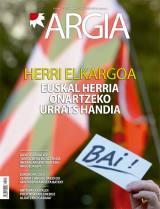



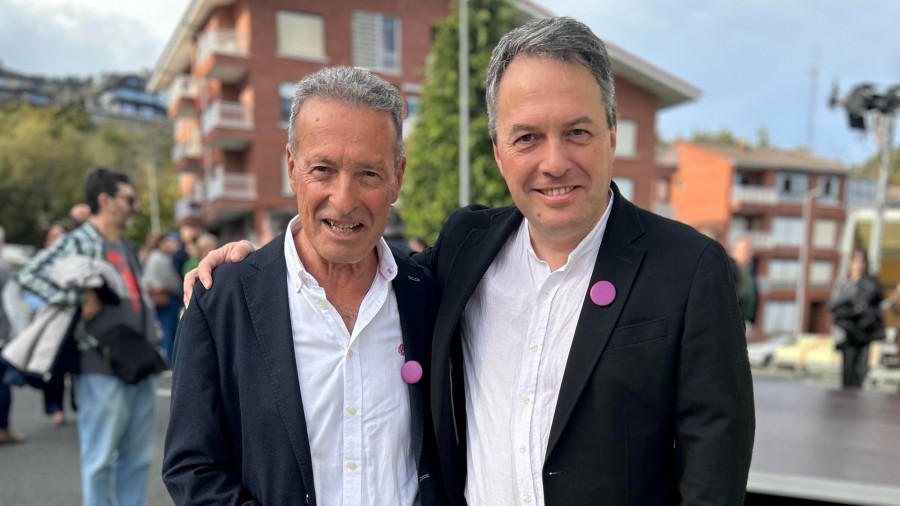

.jpeg)


